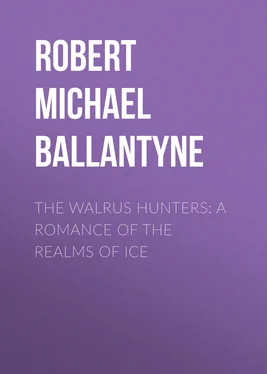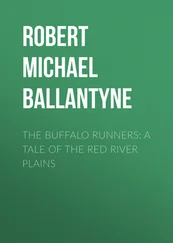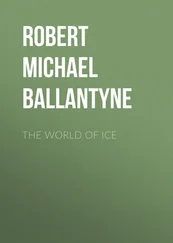Robert Michael Ballantyne - The Walrus Hunters - A Romance of the Realms of Ice
Здесь есть возможность читать онлайн «Robert Michael Ballantyne - The Walrus Hunters - A Romance of the Realms of Ice» — ознакомительный отрывок электронной книги совершенно бесплатно, а после прочтения отрывка купить полную версию. В некоторых случаях можно слушать аудио, скачать через торрент в формате fb2 и присутствует краткое содержание. Жанр: Детские приключения, literature_19, foreign_antique, foreign_prose, foreign_children, на английском языке. Описание произведения, (предисловие) а так же отзывы посетителей доступны на портале библиотеки ЛибКат.
- Название:The Walrus Hunters: A Romance of the Realms of Ice
- Автор:
- Жанр:
- Год:неизвестен
- ISBN:нет данных
- Рейтинг книги:3 / 5. Голосов: 1
-
Избранное:Добавить в избранное
- Отзывы:
-
Ваша оценка:
- 60
- 1
- 2
- 3
- 4
- 5
The Walrus Hunters: A Romance of the Realms of Ice: краткое содержание, описание и аннотация
Предлагаем к чтению аннотацию, описание, краткое содержание или предисловие (зависит от того, что написал сам автор книги «The Walrus Hunters: A Romance of the Realms of Ice»). Если вы не нашли необходимую информацию о книге — напишите в комментариях, мы постараемся отыскать её.
The Walrus Hunters: A Romance of the Realms of Ice — читать онлайн ознакомительный отрывок
Ниже представлен текст книги, разбитый по страницам. Система сохранения места последней прочитанной страницы, позволяет с удобством читать онлайн бесплатно книгу «The Walrus Hunters: A Romance of the Realms of Ice», без необходимости каждый раз заново искать на чём Вы остановились. Поставьте закладку, и сможете в любой момент перейти на страницу, на которой закончили чтение.
Интервал:
Закладка:
The old chief ceased, amid many “ho’s!” and “hoo’s!” with the air of one who has propounded an unanswerable riddle, and all eyes were at once turned upon Nazinred. Accepting the challenge at once he stretched forth his hand:
“My father has spoken,” he said, “but his words are not the words of wisdom. Why should we fight the Eskimos again, and lose some of our best young men, as we lost them in the last great fight? The Eskimos have come near our lands, but they have not of late hunted on them. They have only looked and gone away. And even if they did hunt, what then? The land is wide. We cannot use it all. We cannot kill all the birds and deer, and even if we could we cannot eat them all. Would it not be wise to live at peace with the Eskimos? They have many great teeth of the walrus and skins of the seal. Might not the white traders, who take our furs and give us guns and powder, be willing to take these things too? Thus we could buy from the one and sell to the other, and fill our lodges with tobacco, and guns, and beads, and cloth, and powder and ball, and other good things.”
The Indian stopped at this point to ascertain the effect of his remarks, but only a few faint “ho’s!” greeted him. The councillors did not feel quite sure of their own minds. His remarks about peace and war were not palatable, and his suggestions about trade were a novelty. Evidently Nazinred was born much in advance of his time.
“It is true,” he continued, “that I had a struggle with a young Eskimo; but he was very strong, and so was I. Before I could kill him he caught hold of my gun, but he could not force it from me, and I could not force it from him. As we strove we looked into each other’s eyes and we each saw peace and good-will there! So we ceased to fight. We kindled a fire and sat down and fed together. As the light slowly increases while the sun rises, so light came into my mind. The Dogribs have always talked of the Eskimos as if they were fools. I found that this young man was not a fool—that he was wise—wiser than some of our own braves. His mind was deep and wide. He did not talk only of food and sleep and hunting. He spoke of things past and present and future, and of the Great Spirit, and the world to come. Also of peace and war; and we both agreed that peace was good and war hateful. More than that, we found that it was foolish. Then we parted. He went, I suppose, to his people on the sea of ice, and I came home.
“He told me that none of his people were with him—that he was alone. There is therefore no occasion for the young men to look fierce or go on the war-path.”
Having thus tried to throw oil on the troubled waters Nazinred came to an abrupt pause.
Instantly one of the younger councillors, named Magadar, sprang to his feet. He was unusually excitable for an Indian. Indeed, he differed a good deal from his companions in other respects, being passionate, impulsive, hasty, and matter-of-fact; in his speech-making too he scorned the use of symbol and metaphor, but went straight to the point at once in the simplest and most forcible language at his command.
“Braves,” he said, looking at the previous speaker with a dark frown, “the Dogribs know nothing of those strange and stupid notions that have just come out of the lips of Nazinred. He says that this dirty Eskimo is a deep thinker and a man who loves peace. How does he know that one of that sort may not think so deeply as to deceive him? How does he know that the young man is not a liar—that many of his warriors may not be in our hunting-grounds even at this moment, though he says there are none? As for his talk about the Great Spirit and the future, what does he know about either the one or the other? Is he wiser than the Dogribs? Does his attack on Nazinred look like a lover of peace? His leaving off when he found that Nazinred was his match seems to me more like sly wisdom than the hatred of war. My advice is not to trust these dirty men of the ice, but to take our guns at once and drive them from the land.”
It was quite evident from the way in which this speech was received that the war-party was in the ascendant, and there is no doubt that Magadar’s advice would have prevailed, and a war-party been organised forthwith, but for the arrival of a band of successful hunters, who had been out for some time in quest of food.
For a considerable part of that winter those Indians had been in a condition of semi-starvation. They had managed with difficulty to sustain themselves and families on rabbits, which were scarce that year. With the return of spring and the wild-fowl, however, things had begun to improve, and the hunting party above referred to was the first of the season that had returned to camp heavily laden with geese, ducks, plover, and other supplies of food, so that the half-famished people gave themselves up to feasting, and had no time to think further of war.
Thus many days were passed without any reference being made to a fight with the Eskimos, and Nazinred, believing that the fancy to go on the war-path had passed away, set off on what was to be a long hunting expedition with three of his comrades who were like-minded with himself. Among other plans, this party intended to visit the establishment of the fur-traders on Great Bear Lake.
Thus when the belligerent party of Eskimos arrived at the mouth of Greygoose, or Whale, River, they found the place, as they had been accustomed to find it, a complete solitude.
At first they expected to overtake their comrade Cheenbuk there, but he was not found, having gone a considerable way inland in pursuit of game. Being aware of his peaceful proclivities, however, the Eskimos were not sorry to miss him, and they set about making an encampment on the shore at the mouth of the river, intending to leave the women there while they should be engaged in hunting and in searching for the Fire-spouters.
Meanwhile these Fire-spouters, having eaten and slept, and eaten and slept again, to the extent of their capacities, began to experience a revival of the war-spirit.
In front of one of the lodges or leather tents, one morning early, there sat two squaws engaged in ornamenting moccasins and discussing the news of their little world.
It was one of those bright genial mornings in spring peculiar to Arctic lands, in which Warmth comes out with a burst victorious, and Cold shrinks away discomfited. Everything looked as if a great revival of Nature were at hand—as in truth it was, for the long Arctic winter is always driven away with a rush by the vigour, if not the violence, of the brief Arctic spring.
One of the women was young and pretty—yes, we might almost say beautiful. It is quite a mistake to suppose that all savages are coarse, rough, and ugly. Many of them, no doubt—perhaps most of them—are plain enough, but not a few of the Indian squaws are fairly good-looking, and this one, as we have said at the risk of being doubted, was beautiful; at all events she had a fine oval face, a smooth warm-coloured skin, a neat little nose, a well-formed mouth, and jet-black hair, with large lustrous eyes, to say nothing of her teeth, which, like the teeth of most Indians, were regular and brilliantly white. Her name was Adolay—that being the Indian name for Summer.
The other squaw was her mother. She was usually styled Isquay—which means woman—by her husband when he was at home, but, being a great hunter, he was not often at home. Poor Isquay might have been good-looking in her youth, but, alas! hard work, occasional starvation, and a rough life, had prematurely dissipated her beauty, whatever it might have been; yet these conditions could not put to flight the lines and dimples of kindliness which played about her weatherworn eyes and cheeks. You see, she had a gentle, indulgent husband, and that made her happy and kept her so.
Читать дальшеИнтервал:
Закладка:
Похожие книги на «The Walrus Hunters: A Romance of the Realms of Ice»
Представляем Вашему вниманию похожие книги на «The Walrus Hunters: A Romance of the Realms of Ice» списком для выбора. Мы отобрали схожую по названию и смыслу литературу в надежде предоставить читателям больше вариантов отыскать новые, интересные, ещё непрочитанные произведения.
Обсуждение, отзывы о книге «The Walrus Hunters: A Romance of the Realms of Ice» и просто собственные мнения читателей. Оставьте ваши комментарии, напишите, что Вы думаете о произведении, его смысле или главных героях. Укажите что конкретно понравилось, а что нет, и почему Вы так считаете.












